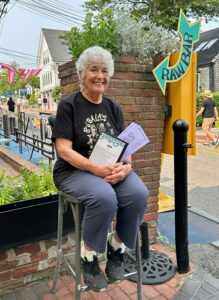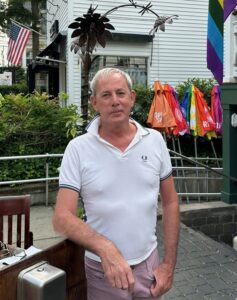PROVINCETOWN — The Outer Cape economy is built on hospitality, yet few of its jobs are as intensely and relentlessly customer-focused as the restaurant host. For hours on end, these keepers of the front of the house perform a kind of magic, squeezing out seats for a party with two extra guests or calming a “hangry” patron with a cocktail or a seat at the bar.

While hospitality is all about pleasing customers, restaurant hosts must sometimes disappoint them.
Mary-Jo Avellar, who has hosted at Bubala’s by the Bay in Provincetown for 26 years, recalls a lesson she learned scooping ice cream at Howard Johnson in the mid-1960s. “I was told by my boss, ‘The customer is always right, even when he’s wrong.’ ”

Although nearly every restaurant worker has heard some variation of this motto, it can’t always be followed when hosting. Avellar says she once turned away a man who had a printed card with six different allergies.
“Two of them were cruciferous vegetables and peanuts,” she says. Because of the chance of cross-contamination in the kitchen, “we decided he’d go someplace else. Sometimes it’s just too hard.”
Rachel Judlin, who is manager and host at Provincetown’s Red Inn, was a middle-school teacher when her cousin, restaurant owner Philip Mossy, offered her a hosting job during the pandemic. Hosts are often “the bearer of bad news or the person who takes the brunt of the anger” when a table isn’t available, she says.

Hosts are “type-A people who want to make everyone happy — we’re people pleasers,” Judlin says. “It always kind of breaks my heart to not be able to fix everything.”
In addition to individual customers, hosts have to keep in mind the whole restaurant’s capacity and flow, she says. “When you’re a host, it’s like you own the whole floor.”
Nearly every host has a story of customers they could not please. Caroline Lovati-Brown, who is now a senior at Nauset Regional High School, has hosted for three years at her mother’s restaurant, Liz’s Café, and recalls a party that rejected three different seating options.

“They were first unhappy with the corner booth,” Lovati-Brown says. “Then they didn’t want to sit outside because the picnic tables don’t have back support. After that, they were upset that the wait was taking longer than we predicted.”
Cynthia Figueroa, a host at Mac’s Shack in Wellfleet, says that she tries to always “be nice, even though sometimes it’s really hard because customers can be pushy.”
Predicting the wait time for a table can be tricky, she says, “because if you give them too much time, they will be upset; if you give them an underestimate, they will also be upset.”
The best approach, Figueroa says, is “to explain how the system works — it really is just an estimate.”
David Gips, a longtime host at Napi’s Restaurant and now the host at Local 186 on Commercial Street, says he doesn’t think he’s good with people and would “rather be with animals. But you learn how to fake it.”

After almost 30 years of hosting, remembering and recognizing people is the key to his strategy, he says. “Everybody wants to be seen,” says Gips. “People want to know that they are acknowledged in the world.”
Judlin says that “a gender thing” can make the hosting job fraught for women. “One of my head hosts here is a wonderful, tall, beautiful Brazilian gentleman,” she says. “People ask him all the time if he’s the manager instead of me. You can feel dismissed in a lot of situations.”
Lovati-Brown agrees that gender seems to matter when hosting. Even though she has more experience as a host than her older brother, “people don’t mess with him” like they do with her, she says.
She also takes difficult customers with a large grain of salt. “I have to say, ‘hungry’ is the worst mood anyone can be in,” she says. “People just say anything when they’re hungry.”
Ultimately, it’s the large majority of pleasant customers that keep them in their jobs, say several restaurant hosts. Figueroa, who is from Mexico and has an H-2B visa, says they are the reason she returns to Wellfleet every year. The customers at Mac’s Shack “are very nice — and they actually know where my country is,” she says.
Mary-Jo Avellar says that “for the most part, people are happy to be welcomed warmly and chatted with.”
Gips agrees. “Ninety-eight percent of people are good people,” he says, “what humans are meant to be.”



